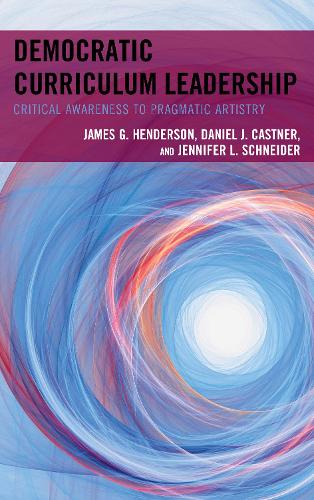
Democratic Curriculum Leadership: Critical Awareness to Pragmatic Artistry
(Paperback)
Available Formats
Publishing Details
Democratic Curriculum Leadership: Critical Awareness to Pragmatic Artistry
By (Author) James G. Henderson
By (author) Daniel J. Castner
By (author) Jennifer L. Schneider
Bloomsbury Publishing PLC
Rowman & Littlefield Publishers
6th March 2018
United States
Classifications
Professional and Scholarly
Non Fiction
375.001
Physical Properties
Paperback
142
Width 151mm, Height 230mm, Spine 9mm
231g
Description
This book provides educators with guidance on studying and practicing a curriculum problem solving artistry that is focused on deepening students subject matter understandings through democratic self and social understandings. The book begins with a discussion of seven principles of curriculum leadership, which provide a framework for the presentation of a theoretical platform that guides a four-phased process. The curriculum problem solving has four interrelated phases, and advice on studying and practicing each phase has been organized into separate chapters using a montage format incorporating inquiry prompts, supportive quotations, critical commentaries, practical tips, narrative illustrations, and study recommendations. There is a continuous recognition of the ways in which the four phases are folded into one another in highly interactive ways; hence, the problem solving approach is described as a fourfold process. The text concludes with an epilogue honoring the disciplined journey of understanding and the pursuit of professional virtues that are central to the cultivation of problem solving artistry. An ethical oath that was created by twenty Ohio teacher leaders serves as a collegial pledge to embrace this disciplinary commitment.
Reviews
Drawing on the results of a three-year grant funded by the Ohio Department of Education, Henderson, Castner, and Schneider develop a wonderfully original project that honors the primacy of practice in philosophical reflection in ways that enable curriculum-teaching-leadership to emerge as pedagogical problem solving artistry. It will reinvigorate teachers as well as students, parents, educational administrators, and other educational leaders in the larger community. -- Jim Garrison, Virginia Tech and Uppsala University
A valuable resource for all educators, this book provides an abundance of ways to employ Deweys ideas in todays schools. Much needed! -- Nel Noddings, Lee L. Jacks professor of Education, Emerita, at Stanford University
Henderson, Castner, and Schneiders volume is an extraordinary accomplishment. Written in a highly accessible style and combined with a wealth of practical illustrations, the volumes emphasis on professional judgment and professional autonomy offers a breath of fresh air for educational leaders who have long been beleaguered by technical and reductionist approaches to their work. Democratic Curriculum Leadership is essential reading for all teachers and educational leaders committed to integrating democratic values and decision-making into their professional practice. Curriculum scholars will be highly interested in the books well-developed and comprehensive restructuring of the fields conceptual centerpiecethe Tyler Rationale. In doing so, the authors adroitly repair longstanding divisions between the critical and the aesthetic branches of reconceptualist and post-reconceptualist thought. The authors fourfold approach is deeply informed by critical and aesthetically-oriented writers ranging from John Dewey, Nel Noddings, and Paulo Freire to Joseph Schwab, Elliot Eisner, and Maxine Greene. With this volume, Henderson, Castner, and Schneider have proven themselves to be groundbreaking educational theorists. -- David J. Flinders, Professor of Curriculum Studies, Indiana University
Author Bio
James G. Henderson is Professor of Curriculum Studies at Kent State University, where he holds the Rebecca Tolle and Burton W. Gorman Chair in Educational Leadership. His publications address the topics of reflective teaching, transformative curriculum leadership, democratic collegial study, curriculum wisdom, curriculum-based pedagogy, and reconceptualized curriculum development. Daniel J. Castner is an Assistant Professor of Early Childhood Education & Teacher Leadership at Bellarmine University in Louisville, Kentucky. His scholarship addresses teachers endeavors to enact and lead democratic curriculum and pedagogy amidst the era of standardization and accountability. Jennifer L. Schneider is a doctoral candidate in Curriculum and Instruction at Kent State University with an academic and teaching background in Art Education, Art History, and English Education. Her scholarly interests dwell in aesthetics, everyday life, and holistic education.
